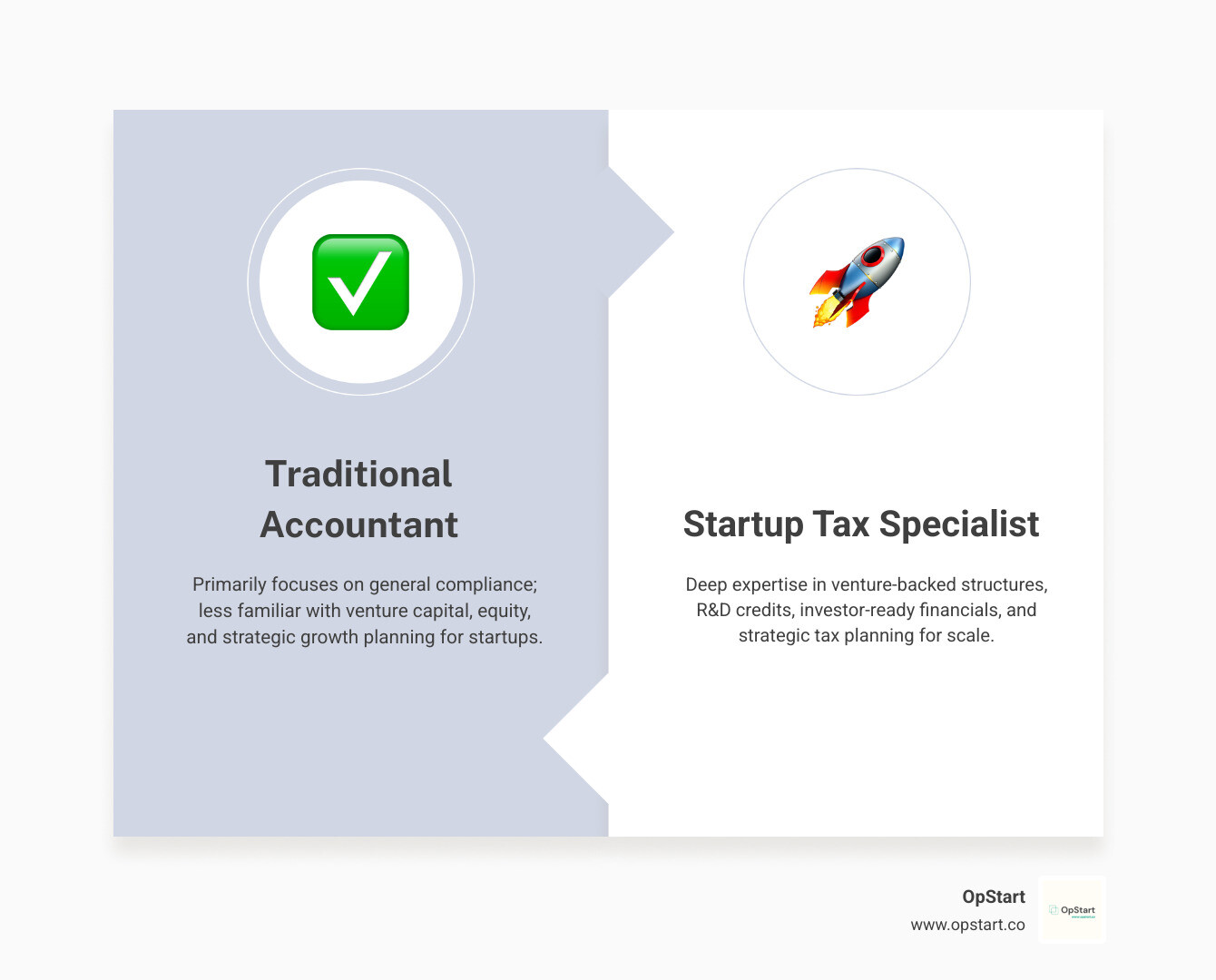Why Choosing the Right Financial Partner Can Make or Break Your Startup
A startup tax firm is a specialized financial services provider offering accounting, tax preparation, and strategic guidance custom to the unique needs of startups. Unlike traditional accounting firms, these specialists understand venture capital, equity compensation, and the complex financial landscape that startups steer.
Key services startup tax firms provide:
- R&D tax credits – Up to $500,000 annually, even for unprofitable companies
- Startup-specific tax preparation – Federal, state, and Delaware Franchise Tax
- Investor-ready bookkeeping – GAAP-compliant financial statements
- Strategic tax planning – Optimizing for future funding rounds and exits
- Fractional CFO services – Financial modeling and cash flow management
The numbers tell a sobering story: 50% of Canadian startups fail within 5 years, with mismanaging finances being the number one reason. Yet research shows that startups working with specialized financial partners have dramatically better outcomes, with some studies indicating they are twice as likely to be acquired as the average startup.
Your choice of financial partner isn’t just about staying compliant. It’s about having a strategic ally who understands SAFEs, board decks, and financing rounds—someone who can help you maximize every tax credit while preparing your company for growth.
I’m Maurina Venturelli, Head of Go-to-Market at OpStart. Throughout my career helping high-growth companies, I’ve seen how the right startup tax firm partnership can transform a founder’s ability to focus on what matters most—building their business.

Quick startup tax firm definitions:
Why Your Startup Needs More Than a Traditional Accountant
Imagine closing your seed round only to have your traditional accountant ask, “What’s a SAFE?” It’s a clear sign your financial partner doesn’t speak startup.
The startup tax firm landscape exists because startups have a different financial DNA. A neighborhood CPA excels with established companies but often stumbles when faced with venture capital complexities, equity compensation, and the rapid decision-making of startup life.
Investor expectations are high, and due diligence readiness can make or break your next funding round. You need a team that can deliver investor-grade financials on short notice, understanding the urgency involved.
Traditional firms also face scalability challenges. As you grow from 5 to 50 employees, their limitations become obvious when they can’t explain burn rate trends or provide strategic insights to your board.
This is where specialized financial operations make all the difference. Learn more about comprehensive accounting and finance services designed specifically for high-growth companies.
The Unique Financial DNA of a Startup
A startup’s finances are unique. Instead of predictable revenue, you steer a world of funding rounds, 409A valuations, and Qualified Small Business Stock (QSBS) regulations, which can save founders millions in capital gains taxes.
For example, most startups incorporate in Delaware, creating specific Delaware Franchise Tax obligations. A local accountant may see this rarely, but a specialized startup tax firm handles it daily and knows how to optimize your filings.
Industry-specific knowledge is also crucial. SaaS companies need experts in recurring revenue, CPG brands need partners familiar with inventory management, and HealthTech startups face unique regulatory requirements that generic firms don’t encounter.
It’s not just technical knowledge; it’s understanding how these elements impact your growth and investor relations.
Strategic Focus vs. Pure Compliance
This is where traditional and startup financial management diverge. Traditional firms focus on compliance—filing taxes and balancing books. Startup-focused firms think strategically about your exit strategy, acquisition readiness, and long-term financial health.
Mismanaging finances is the top reason startups fail. This isn’t just about accounting errors; it’s about lacking the proactive planning and strategic support needed for financial health.
A specialized startup tax firm acts as a co-pilot, helping with burn rate management, cash flow optimization, and preparing for future funding rounds. They know today’s financial decisions impact tomorrow’s valuation.
Respected experts in startup finance emphasize that the right financial partner doesn’t just keep you compliant—they actively contribute to your growth strategy. They help you identify opportunities, avoid costly mistakes, and present your financial story in ways that investors understand and appreciate.
This strategic approach looks beyond this quarter’s taxes to next year’s Series A, turning compliance into a competitive advantage. That’s the difference between surviving and thriving.
Open uping Growth: Key Services of a Startup Tax Firm
A startup tax firm is your financial co-pilot, not just a number cruncher. They actively help you steer the complex financial landscape of building a company from scratch.
These firms offer solutions beyond traditional accounting, providing financial transparency for investors, ensuring regulatory compliance, and offering strategic support for non-dilutive funding. They become an extension of your team, handling the financial heavy lifting so you can focus on building your business.
Specialized firms understand the startup journey. You need a partner for ongoing strategic guidance, smart financial decisions, and positioning your company for growth. For more details on the kind of strategic financial support that can transform your startup’s trajectory, check out: More info about fractional CFO services.
Maximizing Runway with R&D Tax Credits
R&D tax credits are one of the most powerful tools in a startup’s financial arsenal. They are the government’s way of rewarding innovation with real cash.

You don’t need to be profitable to claim up to $500,000 in R&D tax credits annually. Even pre-revenue startups can get money back from the government. These credits can offset payroll taxes, directly improving your burn rate and extending your runway.
This is a game-changer. You get a substantial cash influx without giving up equity. We’ve seen companies receive an average of $21,000 annually, with some finding they are eligible for credits 2.5-4 times larger than expected.
The catch is that you need an expert who understands the tax code to identify all eligible activities. A specialized startup tax firm uses technology and expertise to uncover every credit, turning a potential liability into non-dilutive funding.
Foundational Bookkeeping and Reporting
Bookkeeping isn’t glamorous, but it’s critical. Getting it wrong can cause serious problems.
A specialized startup tax firm handles the foundational work of maintaining accurate financial records, managing the monthly close, and ensuring GAAP compliance. Clean, accurate books are what separate professional startups from hobby projects in the eyes of investors.
For your next funding round or due diligence, you’ll need investor-ready financials that tell a clear story. Avoid the scramble to clean up messy books when an investor asks for your statements.
Professional bookkeeping saves time and reduces costly mistakes. Even getting your EIN (Employer Identification Number) must be handled properly from the start. While The IRS website explains when you need an EIN, experts ensure it’s set up correctly.
The monthly close provides reliable, up-to-date information on your business performance. Professional bookkeeping gives you clear answers to questions like “How much runway do we have?” and “Are we on budget?” For more details on how professional bookkeeping can support your growth, visit: More info about bookkeeping services.
Strategic Tax Planning and Compliance
Tax compliance for startups is a complex, changing game. A good startup tax firm helps you win it.
This goes beyond annual tax returns to a comprehensive strategy covering federal and state income taxes, multi-state sales tax, 1099 filings, and specialized requirements like the Delaware Franchise Tax.
Newer requirements like FinCEN’s Beneficial Ownership Information Reporting add another layer of complexity.
The real value is proactive tax strategy. A specialized firm helps you plan ahead to legally minimize your tax burden, use every deduction and credit, and position your company for tax efficiency as you grow.
U.S. tax laws are complex and evolving. A partner who stays on top of these changes lets you focus on your business, not compliance worries. They ensure you meet deadlines, maintain IRS compliance, and avoid surprises that could derail your growth.
The Modern Advantage: Technology and Pricing Structures
Dusty ledgers are a thing of the past. Today’s startup tax firm operates like a tech company, with a tech-forward approach that transforms financial work.

Modern firms use automation and AI-powered analysis for complex calculations. For instance, AI can process messy data for R&D tax credit calculations and deliver audit-proof results. This means less manual work and more time for strategic insights.
The real magic is seamless software integration. The best firms integrate with your existing tools, creating real-time data flows for instant financial visibility. No more waiting for month-end reports or scrambling for numbers.
The Modern Startup Tech Stack
Your startup tax firm should speak your tech language, working seamlessly with cloud accounting software like Xero and QuickBooks, payroll systems, and expense management tools.
With an integrated approach, financial data flows automatically. Payroll expenses appear in your books, expense reports sync without manual entry, and financial statements update in real-time.
This isn’t just for convenience; it’s about accuracy and speed. Integration reduces human error and provides a complete, up-to-date financial picture without delays.
At OpStart, we’ve built our services around integrated financial operations. We work with your preferred software stack for a seamless experience. Learn how we optimize your financial tech stack: More info about startup tech stack.
Startup-Friendly Pricing: Fixed Fees vs. Hourly Rates
Specialized startup tax firms understand that unpredictable costs can kill cash flow. Unlike traditional firms that bill by the hour, startup-focused firms offer fixed-fee models or subscription pricing.
This approach creates predictable costs you can budget for. You know your monthly payment, avoiding surprise bills for quick questions. Some firms offer bookkeeping starting at just $199 per month.
Fixed-fee models also create better alignment. Firms are motivated to work efficiently and use technology, not to rack up billable hours. They succeed when you do.
This transparent pricing is the industry standard for good reason. It lets you avoid surprise bills and get expert guidance at a cost that fits your budget, so you can focus on your business.
Startup accounting services typically range from $2,500 to $25,000 annually. With fixed pricing, you’ll know your cost from day one.
Vetting Your Options: How to Select the Best Partner
Choosing the right startup tax firm is a critical decision for your company’s financial health. It’s not just about filing taxes; it’s about selecting a strategic partner who understands your journey and can scale with you. The evaluation should be thorough, aiming to find a firm that feels like a trusted extension of your team.
To help, here are key questions to ask any potential firm to uncover if they have the specialized expertise your startup needs:
- How deep is your experience specifically with venture-backed startups and their unique financial complexities?
- Can you provide examples of how you’ve helped startups similar to ours maximize R&D tax credits or steer specific funding rounds?
- What is your communication style? Do you offer dedicated account managers or use tools like Slack for quick questions?
- How do you leverage technology and automation to streamline processes and provide real-time data?
- What is your pricing structure, and how does it ensure predictable costs as we grow?
- Can you scale your services from our current stage (e.g., pre-seed) to future growth stages (e.g., Series C and beyond)?
- Do you have specialists with Big 4 tax experience or CPA/CFO credentials on staff?
- Can you provide client testimonials or references from other founders?
Key Evaluation Criteria for a Startup Tax Firm
When evaluating a financial partner, look beyond the surface at their track record and approach.

Here are the key criteria for an exceptional startup tax firm:
Startup-Specific Experience: Do they understand SAFEs, board decks, and financing rounds? Firms involved with accelerators like YC, Harvard i-Lab, or Stanford StartX often have this innate understanding. They should live and breathe the startup ecosystem.
Scalability of Services: Can the firm support your growth from pre-seed to Series C and beyond? The ideal partner should be the last accounting firm you’ll need, capable of evolving with you.
Team Expertise: Look for a team of experienced CPAs, fractional CFOs, and tax specialists. A deep bench of experts with credentials like Big 4 tax experience provides superior service and peace of mind.
Client Testimonials: These are invaluable. Look for endorsements from other founders that praise responsiveness, strategic insights, and proven savings. They offer a peek into the partnership.
Communication Style: A good partner offers responsive communication via Slack, email, or calls. You should have a dedicated point of contact who feels like an extension of your team.
Tech Proficiency: A modern firm must be tech-forward, using AI-enabled software and seamless integrations with your tech stack (Xero, QuickBooks, etc.). This ensures clear financials and quick answers.
Red Flags and How to Avoid Them
It’s also crucial to recognize red flags to avoid a bad partnership, saving you time, money, and headaches.
One-Size-Fits-All Approach: This is a major red flag. A firm should understand your specific industry (SaaS, CPG, HealthTech) and stage of growth. Your financial solution must be customized, not a cookie-cutter service.
Lack of Tech Integration: Beware of firms relying on manual processes or struggling to integrate with your cloud tools. This leads to inefficiency, errors, and a lack of real-time data for decision-making.
Hourly-Only Billing: This signals unpredictable costs and misaligned incentives. Look for transparent, predictable pricing models like fixed fees.
Poor Communication: If initial interactions are slow or vague, it’s a deal-breaker. A good partner communicates clearly and responsively, especially during critical times.
Unfamiliarity with Startup Terms: If they don’t know terms like “SAFE notes” or “board decks,” they lack the specialized experience you need. They must speak your language.
Lack of Credentials or Transparency: Ensure the firm’s professionals have necessary certifications (CPAs, IRS Enrolled Agents). You can Check for a valid EFIN on the IRS website to confirm they are authorized to file electronically.
Frequently Asked Questions about Startup Tax Firms
Can a startup tax firm help if we’re not profitable yet?
Absolutely. Engaging a startup tax firm is crucial for pre-revenue or unprofitable startups. They help set up your business structure correctly, ensure compliance, and secure non-dilutive funding. For example, even without revenue, you can use R&D tax credits to offset payroll taxes. This improves your burn rate and extends your runway. Profitability isn’t a prerequisite for claiming valuable tax credits, making these firms invaluable partners from the start.
What’s the difference between bookkeeping and tax services?
Think of bookkeeping as the daily recording of your company’s financial transactions. It’s the ongoing process of keeping your financial records clean and organized to produce essential financial statements. Tax services use these records to prepare and file your tax returns. Beyond filing, a good startup tax firm ensures you’re compliant with all tax laws and develops strategies to legally minimize your tax liability. A comprehensive firm integrates both functions, managing your bookkeeping year-round to ensure everything is accurate and optimized for tax season. This integrated approach provides peace of mind and lets you focus on your business.
How early should a startup engage a tax firm?
Ideally, you should engage a startup tax firm from day one. It’s one of the smartest early decisions you can make. Expert guidance from the beginning ensures your business has the proper legal and tax structure, preventing costly mistakes later. Starting with clean financial records and a solid structure streamlines future processes like raising capital or a potential acquisition. A professional firm can guide you on best practices for expense tracking, payroll, and tax planning, helping you maximize credits like the R&D credit from the start. This builds your business on a solid financial foundation and keeps you investor-ready.
Conclusion
Navigating complex startup finances can be daunting. Partnering with the right startup tax firm is not an expense but a strategic investment in your company’s future.
It’s more than just compliance. A specialized startup tax firm becomes an extension of your team, understanding the unique financial DNA of a high-growth venture. They speak the language of SAFEs, R&D tax credits, and investor expectations, aligning your financial strategy with your growth ambitions.
They use technology to streamline processes, offer predictable fixed-fee pricing, and bring the expertise needed to maximize tax credits, optimize cash flow, and prepare you for every stage, from seed funding to a successful exit.
The result is financial peace of mind. Knowing your numbers are expertly managed frees you to focus on building your business, innovating, and leading your team without the burden of financial complexities.
At OpStart, we deliver hands-free, expert-managed finance and accounting for startups. We offer a flat rate and integrate with your preferred software stack for smooth, stress-free financial operations. With the right partner, your startup’s financial journey can be one of confidence and accelerated growth.
Ready to steer your startup’s financial journey with confidence? Explore OpStart’s comprehensive services today.


